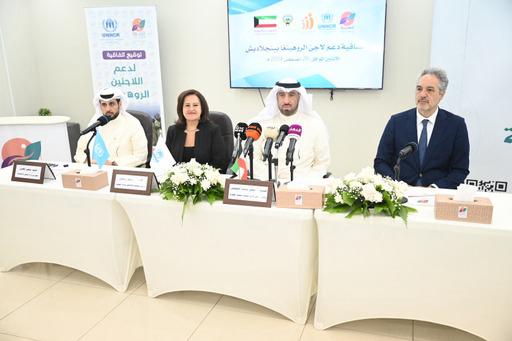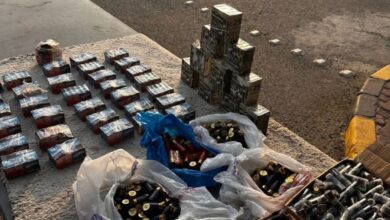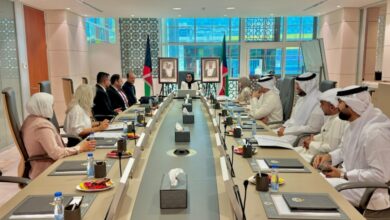UNHCR, Tanmeia ink pact to support Rohingya refugees in Bangladesh
The agreement supports Rohingya refugees through UNHCR and Tanmeia’s Ramadan campaign, benefiting over 60,000 families with water, shelter repairs, and climate change awareness.

-
“Our partnership with Tanmeia over the past four years has helped approximately 450,000 Rohingya refugees, reflecting Kuwait’s deep humanitarian commitment and its eagerness to assist refugees wherever they are,” said Nisreen Rubaian, UNHCR’s Representative in Kuwait.
-
“We reiterate our commitment to alleviating the suffering of refugees and displaced people and supporting relevant international entities, especially given the worsening challenges and harsh living conditions,” said Dr. Nasser Al-Ajmi, Chairman and General Manager of Tanmeia.
-
As of June 30, 2024, around 984,591 Rohingya refugees were registered in Bangladesh and the majority reside in 33 overcrowded camps.
UNHCR, the UN Refugee Agency in Kuwait, and the Global Charity Association for Development (Tanmeia Foundation) have signed a grant agreement to provide shelter, drinking water, and health support to Rohingya refugees in Bangladesh. The agreement was signed by Nisreen Rubaian, UNHCR’s Representative in Kuwait, and Dr. Nasser Al-Ajmi, Chairman and General Manager of Tanmeia, at the Tanmeia Foundation headquarters in Kuwait City.
This agreement is part of the Ramadan fundraising campaign launched by UNHCR in partnership with Tanmeia to support Rohingya refugees in Bangladesh. The combined sadaqah and zakat donations received by the campaign in 2023 and 2024 are expected to benefit over 60,000 refugee families. These contributions will be used to provide safe drinking water, repair and rehabilitate damaged shelters to enhance their resilience to harsh weather and fires, and implement awareness initiatives to address climate change risks and respond to natural disasters.
Regarding health support, UNHCR and its partners will continue to provide medical supplies, medicines, and public health services in the camps. This will focus on both communicable and non-communicable diseases, mental health, integrated psychosocial support, primary dental care, physical therapy, and comprehensive laboratory services across ten healthcare facilities.
Nisreen Rubaian, UNHCR’s Representative in Kuwait, expressed her appreciation for Tanmeia’s support of UNHCR’s humanitarian activities. “Our partnership with Tanmeia over the past four years has helped approximately 450,000 Rohingya refugees, reflecting Kuwait’s deep humanitarian commitment and its eagerness to assist refugees wherever they are. This also reaffirms Kuwait’s role as a global center for humanitarian work.”

She added: “With the increasing urgent humanitarian needs of refugees and displaced persons, now exceeding 120 million people forced to flee due to wars, conflicts, human rights violations, and the impacts of climate change, these sustainable partnerships have become more critical than ever.”
Dr. Nasser Al-Ajmi, Chairman and General Manager of Tanmeia, praised the signing of the agreement with UNHCR to support Rohingya refugees and said: “The ongoing cooperation between the two sides for nearly four years reflects the mutual trust between them, and we are committed to supporting Rohingya refugees and their humanitarian cause.”
He added: “With substantial support from donors and philanthropists, Tanmeia has succeeded in aiding Rohingya refugees through campaigns organized in partnership with UNHCR. We reiterate our commitment to alleviating the suffering of refugees and displaced people and supporting relevant international entities, especially given the worsening challenges and harsh living conditions. Through our partnership with UNHCR and other reliable entities, we strive to provide basic necessities such as shelter, food, clothing, and medicine to those who need them the most.”
As of June 30, 2024, approximately 984,591 Rohingya refugees were registered in Bangladesh. The majority reside in 33 overcrowded camps in the Cox’s Bazar area, while the rest live on Bhasan Char Island. Due to the deteriorating security situation, exacerbated by restricted freedom of movement, lack of employment rights, and limited livelihood opportunities, the camps experienced a 180% increase in serious security incidents in 2023 compared to 2022. Refugees are facing numerous challenges in meeting their basic needs, including shelter, proper nutrition, hygiene facilities, and livelihood opportunities.










